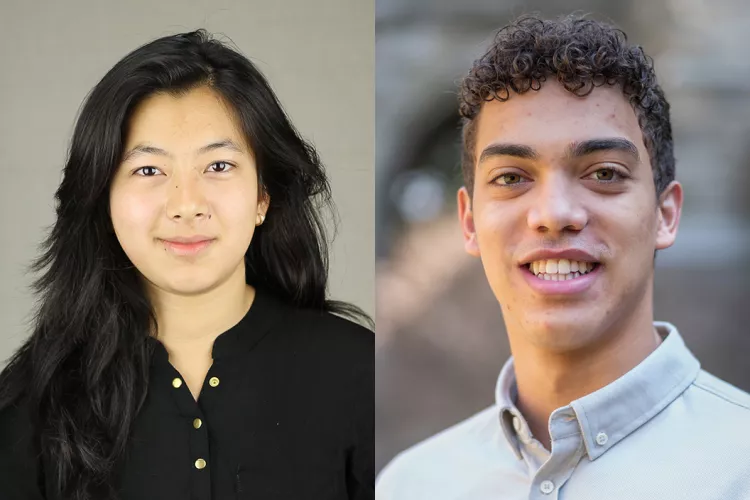Eriko Shrestha ’19 and Tristan Alston ’22 Awarded Lang Social Impact Fellowships

Eriko Shrestha ’19 (left) and Tristan Alston ’22
Eriko Shrestha ’19 and Tristan Alston ’22 have been chosen as the newest recipients of the Lang Social Impact Fellowship (LSIF), a program designed to “empower scholars with their partners to engage in systems-change activities designed to close the gap between social challenges and solutions.”
“We are motivated and inspired to work with these two alumni of the Lang Opportunity Scholarship Program as they engage communities in social change and together disrupt the systems that hold pressing environmental and social problems in place," says Jennifer Magee, senior associate director of the Lang Center for Civic & Social Responsibility.
Shrestha began tackling the problem of electronic waste in Nepal’s Kathmandu Valley as an undergraduate Lang Opportunity Scholar, collaborating with local organizations Karkhana Samuha and Doko Recyclers.
By teaching students how to repair small electronics, Shrestha, Karkhana Samuha, and Doko Recyclers make blenders, water kettles, and rice cookers usable again, and prevent them from ending up in a landfill.
“It is through the continued generosity and support of Eugene M. Lang Foundation that communities facing significant challenges in the U.S. and around the world have come to know Swarthmore alumni like Eriko and Tristan as engaged scholars,” says Professor of Political Science and Lang Center Executive Director Ben Berger.
As an undergraduate, Shrestha helped design a bootcamp to raise awareness about e-waste. It let students know that many electronic devices with small issues can be fixed at home, taught them the basics of electronics repair, and shared how to properly recycle e-waste in Kathmandu if repair isn't possible.
“[The waste trade] employs hundreds if not thousands of informal waste workers, and occupational safety measures are not implemented,” says Shrestha. “Once the various waste streams are separated, they're broken down to raw materials — like copper is stripped from wires, melted, and sold to companies in the south of Nepal to be reused for another product.”
The program offers more than just a course on e-waste: The bootcamp is nested in an existing ecosystem of STEAM (Science, Technology, Engineering, Art, and Mathematics) clubs in public schools and aims to “teach the teacher” by having students return to their clubs and teach their peers. The bootcamp tries to foster playful learning. With the funding provided by the fellowship, Shrestha, Karkhana Samuha, and Doko are putting together a digital toolkit to make home repair resources accessible online and relevant to Kathmandu's context.
“I'm excited about the mentorship component of my LSIF, and look forward to mentoring students interested in environmental issues who are building partnerships within existing networks to make a lasting impact on their communities,” says Shrestha. Current Swarthmore social innovators can get in touch via email: erikoshrestha@gmail.com.
Alston has been focused on supporting students of color in majority-white school districts in Western Massachusetts. As an undergraduate Lang Scholar, he started the Berkshire Equity Research Collaborative “to reimagine how we think about [diversity, equity, and inclusion]and anti-racist work in school districts.” He wants to make sure that it focuses on the needs of students.
Alston grew up in the majority-white Berkshire County and never had a Black teacher until he got to college. He also noticed a problematic pattern in the way school administrators handled racist incidents. An egregious racial “transgression” would occur, such as a lynching threat against a Black student. “Pockets of the community would be outraged,” Alston says, but generally it would be treated as an isolated incident. Then administration would “at most” pull in a local organization, such as the already stretched thin Railroad Street Youth Project, to facilitate an anti-racist dialogue. Afterward, things would go back to business as usual, he says.
“There haven’t really been sustained, anti-racist efforts,” says Alston. “It’s really been in the past two years [since the murder of George Floyd] that the conversation has built momentum and been a bit more sustained in nature.”
Alston is interested in a systems-change approach to anti-racist work in the schools, rather than an incident-based one. He has already identified curriculum change and affinity groups for students of color as potential ways to ensure the long-term sustainability of this work. But Alston wants to make sure the solutions come from the students, rather than implementing what he thinks is best.
His initial undergraduate research project involved designing a survey to assess student needs around anti-racist work, surveying middle schoolers in two grades and facilitating leaderships workshop for students with co-leader Zufan Bazzano of Smith College.
With the funding from the Lang Fellowship, Alston hopes to expand the survey to more schools and more grades, particularly high school students. It will also allow him to continue living in the county so he can focus on advocating for BIPOC students full time.
“I wouldn’t be able to make this my work for the year … without the fellowship, so that’s really exciting and a privilege to be able to do that and to have the resources to focus on this passion work,” he says.
Alston looks forward to mentoring current Swarthmore students. “I am best suited to mentor any current students whose focus lies within the realm of racial (in)equity,” he says. “Because of my undergrad coursework and experiences as a Lang Scholar, I am especially interested in supporting projects and individuals whose orientation centers the needs and experiences of Black and brown youth.” Students can contact him at talston1@swarthmore.edu or tristan.alston@gmail.com.



